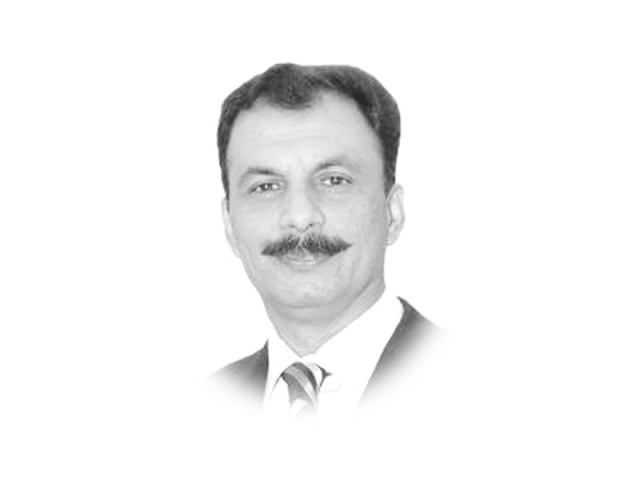Mobilising community-based security
There is a constant refrain that ensuring security is the job of the state, not individuals

The writer is a senior police officer posted to
Khyber-Pakhtunkhwa. He tweets @alibabakhel
The K-P police recently filed 683 FIRs against educational institutions for non-compliance with mandatory provisions of the K-P Sensitive and Vulnerable Establishments and Places Act 2015. In addition, the province recently enacted the Restriction of Rented Buildings Security Act 2014, as well as the Hotels Restriction (Security) Act 2014. In Punjab also we see the enactment of the Security of Vulnerable Establishments Act (PSVEA) 2015 and the Punjab Information of Temporary Residents Act (PITRA) 2015.
The PSVEA 2015 has identified places of worship, other places of religious importance, sensitive offices of the provincial and federal governments, NGO offices, hospitals, banks, money changers, financial institutions, industrial units, educational institutions, public parks, private clinics, wedding halls, petrol and CNG stations, jewellery shops, hotels, entertainment centres, public transport terminals and shopping arcades, as vulnerable establishments. As per requirements of this Act, security arrangements for such places include the installation and functioning of CCTV cameras, biometric systems, walkthrough gates, security alarms and other modern gadgetries.
In addition, the Punjab government plans to make the PSVEA functional at the sub-divisional level through the constitution of Security Advisory Committees (SAC), which would be empowered to identify and inspect vulnerable establishments. SACs will also be able to issue security advices and warnings to these vulnerable establishments and will have the power to seal them in case of non-compliance. To make SACs effective, it is necessary to build the capacity of its members. As far as the PITRA is concerned, it focuses on the collection of information of tenants and other temporary residents. Under this Act, the police will maintain a database of all tenants and guests, and conduct analysis of the data with the aim of preventing, detecting and investigating offences.
In the developed world, commercial institutions and the elite class are not provided security at the cost of the security of common people. When resources are eaten up by such quarters, the security of ordinary citizens is inevitably compromised. In the post-9/11 scenario, our criminal justice system (CJS) has been overburdened, compromising its primary function, i.e., to provide justice. Presently, within the CJS, all endeavours are focused on investing more and more on security. Since security provision is an expensive affair and everyone looks towards government-sponsored security, the gravity of the current state of affairs in the country requires that a surcharge of around one to two per cent is levied on luxury items, which should be exclusively utilised for the enhancement of security.
In Pakistan, the quality of the basic ingredients of security — guns, gates and guards — is often below par. The state alone cannot provide physical security at every stage; however, by mobilising resources that are at the disposal of communities, peace can be achieved. The police in the country are resource-starved and therefore, it is difficult for them to cater to public expectations. Ordinary citizens look at the present fabric of policing and form the impression that the security cover that the police provide is perhaps elite-specific, ignoring that the lack of resources also hinders their work.
Realistically speaking, policing and security are not synonymous. Security is surely a part of policing, but it is high time we drew a line between these two areas. The police should not be reduced to merely performing the role of the security provider. They also have to dedicatedly work for the prevention and detection of crimes.
After the APS and BKU attacks, walls are being raised and CCTV cameras are being mounted all over the country, but hardly anyone stresses the role of the community in security provision, with there being the constant refrain that this is the sole responsibility of the state. What we need to understand is that through the creation of a sustainable security community that understands its role and responsibilities and readily cooperates with law enforcement through volunteerism, a counter-extremism narrative can be established that in the long run can improve the security situation. Our situation warrants that security becomes an integral component of development projects and institutions. Traditionally, we have been focused more on erecting huge infrastructure projects, all the while ignoring their security components, with everyone looking towards free-of-cost state security to come to their rescue. No state can provide security at the individual level. What the state can do is provide an overall protective shield through the regulation and implementation of security protocols.
The federal and provincial capitals have security divisions and units that were established in a bid to bifurcate the security function from the policing function. These units usually comprise unwilling, unprofessional and aged personnel. Incompetence, poor management and the unending demand for free-of-cost security has thinned out the strength of law-enforcement agencies. It’s high time that a reform process with reconsolidation within police departments was carried out. The true antidote for the current state of affairs is political will, transparency and merit. If we desire a safe society, we have to invest more in policing. It is also important to note that security without de-weaponisation, de-radicalisation, effective border management, political will, employment of technology and community participation is going to remain an elusive dream.
Published in The Express Tribune, February 5th, 2016.
Like Opinion & Editorial on Facebook, follow @ETOpEd on Twitter to receive all updates on all our daily pieces.














COMMENTS
Comments are moderated and generally will be posted if they are on-topic and not abusive.
For more information, please see our Comments FAQ